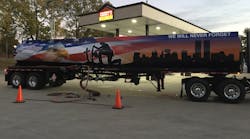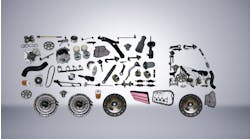“I felt like I was gonna’ hit a home run this year and things were really going well,” said Jon England, president and CEO of Transport Services of Sullivan (TSoS). And then, just like that, business took a turn for the worse for the small Illinois fleet comprising 34 trucks from Daimler Trucks North America (both Freightliner and Western Star).
Because fuel demand dropped nearly 50% year-over-year as of April, customers such as Casey’s General Store didn’t require the services of the fleet. TSoS’s miles were down 25% in March—shutdowns and shelter-in-place orders began in Illinois mid-month. For April miles were down 50%. Gov. J.B. Pritzker is now slowly re-opening the state, which will remain in a tight “flattening” phase until at least May 29.
England also has to contend with high insurance premiums because the business hauls hazardous material, but isn’t generating revenue.
“This is stuff that we've never even seen in anybody's lifetime, even in the Great Depression,” he said. “It’s very difficult to navigate as the rules change greatly by the week.”
Difficult but not impossible for England.
“We're a strong company,” he asserted. “This is going to hurt us. It's not going to take us out.”
Why is he so confident when no one else has any idea what is going to happen next?
For starters, his business has faced national tragedy and shifting demand. The company started as a spin-off to support EK Petroleum after the Sept. 11 attacks. Small operators were having trouble getting fuel, so England went out and bought a tractor-trailer to guarantee his father’s business would have some supply.
Five years later, he was helping out a friend in Jackson, Miss., obtain fuel after Hurricane Katrina. He had a contact out of Chicago that helped him get extra fuel and trucked the loads down to a rail yard in the ravaged delta region. The depot had plenty of diesel fuel, but needed gasoline to supply the workers’ vehicles, which needed to drive to damaged tracks around New Orleans and repair them.
In this crisis, England’s standard operating procedure is no different, stepping up now for his drivers. He made them a promise in March that no matter their hours on the road, they would receive $1,000 a week until June 1.
“We don't know what's going to happen moving forward, but I don't want you to worry about your family's bills,” he recalled writing in a letter to his 35 or so drivers.
The Payment Protection Plan (PPP), which the company received in a few business days, helped England bridge the slow period.
If not for the PPP, layoffs would have occurred in June or July. And that would be difficult to recover from.
“Once you lay somebody off, especially in my business as I'm hauling hazardous material, when you bring them back if the customer needs you, they have to go through training again, they have to be drug tested,” England said. “It’s basically starting over like a new hire.”
Many fleets will have to face that challenge, as trucking lost 88,300 jobs in April, according to the U.S. Bureau of Labor Statistics.
The good news is that because England has always been there for his drivers, paying them hourly wages and providing healthcare coverage, they are there for him. When business does roll in, they are there to steer the load, whatever day, whatever time.
“It's all about the friends that you make,” England said of how he has overcome 20 years of random adversity. “I'm a very loyal person. I try to help people out when they need help, and I’m not afraid to ask for it.”
He pointed out his dealership, Truck Centers, Inc., was one of the first business partners to call and offer help. They worked with Daimler Truck Financial to give a three-month payment extension to free up $24,000 in cash flow.
He also remains optimistic that America will overcome this latest hardship in time.
“When people get 'unquarantined,' I think they're going to get in their car, and [ because of cheaper gas prices] they’ll take an old-fashioned family vacation like they used to back in the ’60s and ’70s maybe drive down to the lake or Florida,” he said. “And I think that's gonna’ bring our business back.”




